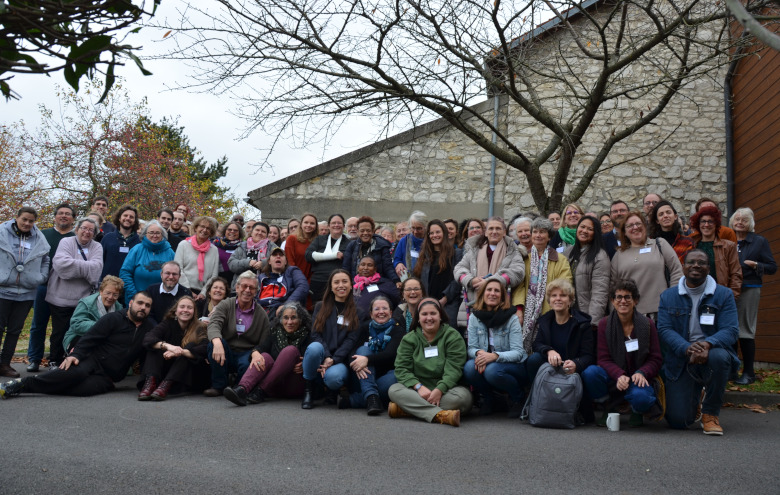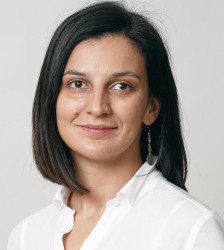The Invisibilization of Poverty: Child Protection in Bulgaria

Above: Building a Future Without Poverty for Children: Parents and Society Together
By Evgeniya Toneva

In November 2023 ATD Fourth World‘s Family Advocacy project held a conference outside of Paris entitled: Building a Poverty-Free Future for Children: Parents and Society Together. At the conference, ATD Fourth World Volunteer Corps member Brigitte Jaboureck addressed the audience on behalf of the project research team. She shared how interventions of the child protection system with people living in poverty across different European countries almost always came up as a topic of conversation. She interpreted that the apparent fear of the child protection system is a certain collective trauma of separation transmitted from generation to generation. The impact of this unresolved trauma is that it effectively stops parents struggling to raise their children from seeking or accepting help.
- These parents fear their words will be misunderstood and used against them by overpowering child protection authorities as evidence that they are failing in their parenting role. This means that parents do not talk about their struggles, and so the parental challenges associated with poverty remain invisible.
In the months following the conference, I often thought about the arguments made by the project’s co-researchers and how they relate to the reality of the child protection system in Bulgaria. As a researcher, this is a reality I am familiar with from my affiliation with the Know-How Centre for the Alternative Care for Children, New Bulgarian University. Reflecting on this, I asked myself, is the situation in Bulgaria so different from the presentation at the November conference?
Why are children and parents in Bulgaria being separated?
The current child protection system in Bulgaria is still in its infancy. It started only about 20 years ago with the introduction of a child protection model that borrows elements from various well-established Western-European systems, particularly the British system. These Western-European systems are currently rethinking this model based on academic research and issues brought to light by activists as well as parents and children with traumatic experiences with these systems. Meanwhile, the Bulgarian child protection system is still grappling with how to address the fundamentally important issues in this field, such as child violence and abuse and professional social work interventions with families and children.
Moreover, Bulgaria’s child protection system has inherited a lot from its past. The legacy is a well-functioning, sprawling all over the country system of large, specialized child care institutions that for over 50 years (prior to the introduction of the Western child protection model) have provided a one-size-fits-all answer to all families’ problems related to child-rearing: placement of the child in an institution. The ideology behind this institutional care system was that the child would receive better care and life prospects in a state institution rather than their family. Now almost all the childcare institutions of this type in our country are closed, but the belief that in many cases the child actually receives better care from the state than from the parents still exists. In the research work of the Know-How Centre, we come across this belief as a persistent attitude in society, sometimes still among professionals, and quite often among parents themselves1.
These attitudes towards childcare, left over from a different political climate, continue to affect parental decisions today. For instance, parents tend to consider placing their children in care when they perceive that the living conditions at home, particularly in cases of poverty, are inadequate. When the decision to separate children from their families is made by child protection authorities, the parents often assume that it is their fault. Family separation is often regarded as both a fair punishment for parents who have not overcome life’s problems, and a “best case scenario” for the child. These attitudes are probably the main reason that the intersections of poverty, that is the specific challenges of parenting when living in poverty and the placement of children in care, receives such little attention.
However, it seems to me that there is also another, albeit more formal, reason for the connection between these phenomena and their invisibility.
What problems does the child protection system actually deal with?
In the past, without a child protection system in place and with a completely different public agenda and discourse, violence, neglect and parental capacity were not at all reasons for placing children in child care institutions. The decision to place children in these institutions was often voluntary on the part of the parents, motivated by specific challenges faced by the family. These boiled down to a lack of resources to care for a child with a disability or other complex needs, for example; illness in the family; lack of partner or extended family support for raising a child; lack of place to live and sustainable employment; several of these together also associated with living in deprivation.
And although in the last 20 years the child protection system has gradually introduced new guidelines in line with Western-European models, the life problems of families have changed little especially given that Bulgaria is still Europe’s poorest country with 1 out of 3 children living at risk of poverty or social exclusion2.
From our research experience at the Know-How Centre, we know that the separation of children and families today most often occurs because multiple factors accumulate, making it a “high-risk” environment (according to the terminology of the child welfare system) for children. Such factors are poor living conditions; social isolation; lack of housing and income; deteriorated family dynamics between parents and extended family, including: separation, conflicts, domestic violence; health problems in children and parents, etc.
Most crucially, what we see is that regardless of whether it is about abandoning a child or taking a child out of the family by the child protection authorities, the factor with the greatest weight in deciding about child-family separation is poverty. Poverty is most often paired with other significant factors to lead to separation: e.g. poverty and disability, poverty and addiction. It is important to note that these other factors by themselves do not always lead to a decision for child-family separation, but in combination with poverty they most often do, that is why we consider poverty the key factor3.
Against this background, social reports and analyses authored by the protection system refer formally to “social neglect” of children; “low parental capacity” and “irresponsible parental behaviour”, but not to poverty and the related marginalisation, which are the main characteristics of the social reality of the families with whom the system works. Without addressing the problems by their real names, this new protection system avoids the conversation about their complex nature and greatly contributes to their invisibility.
What is the perspective?
At the conference, I shared with the participants that there are advantages to the Bulgarian child protection system still finding its feet. “Take it as an opportunity!” one parent activist from the UK told me. But what does that mean?
The child protection system in Bulgaria works in a social environment where (unfortunately) sensitivity to child abuse is low. The truth is that this is also why the system does not intervene as often and as directly in the lives of families as Western-European systems do. As researchers, we know that when the system does intervene, it is often because of family issues related to poverty and marginalisation which indeed make the environment risky.
It is unprofessional and unethical to treat these problems as problems in the field of violence and to treat them through family separation and this is precisely the path on which the protection system should not confidently move forward. The entrenched attitudes of alternative care as ‘better’ and the tendency of parents to accept the blame silently and view separation from their children as a right and just outcome make the real issues invisible. Going down the wrong path is, therefore, dangerously easy.
Bulgaria being at the beginning of its path, presents an opportunity to create an effective and just system. We can learn from current and past experiences of those in alternative care, avoid previous pitfalls, and partner with struggling parents to fight poverty and other challenges. This should all be with the goal of keeping families together and eliminating the culture of “parental guilt” for parents who come forward and ask for help.
This is an opportunity to consciously and confidently stimulate the development of a culture of empathy, partnership and participation on the way towards raising awareness about violence against children and building parental skills.
- Bulgarian Deinstitutionalization – failure or success? Results of a national study conducted in 2020-2021. https://knowhowcentre.nbu.bg/balgarskata-deinstitucionalizacia-proval-ili-uspeh/
- UNICEF 2022 page 4: Un/Equal Childhood: Deep Dive in Child Poverty and Social Exclusion in Bulgaria
- Know-how Centre for Alternative Care for Children, NBU (2024). Separation of children and their families in Bulgaria: study of the experience of the organizations from the Childhood 2025 Coalition in working with cases of child-family separation. (results soon to be published)

